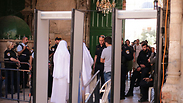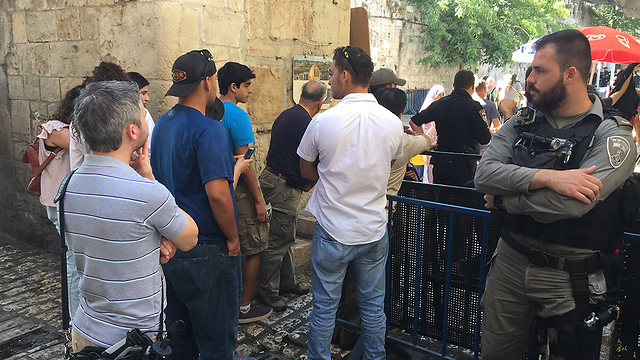
Israel prepares for Muslim 'day of rage' over Temple Mount crisis
As Israel attempts to calm down an enraged Muslim public, Jordan attempts to help solve crisis, while warning that only removing additional security measures will prevent it; Israeli security officials privately object to removing metal detectors.
Israel is reportedly conducting intensive contacts with Jordan to end the crisis on the Temple Mount compound before the crisis reaches a boiling point due to mass noon prayers planned around the compound.
The political contacts on behalf of Israel include Prime Minister Benjamin Netanyahu's emissary Yitzhak Molcho, the head of the Shin Bet and the Coordinator of Government Activities in the Territories. Netanyahu himself spoke on Wednesday with Israel's security chiefs as tensions mounted over the Temple mount, where Muslims called for mass protests as part of an organized "day of rage."
Palestinian and Israeli sources told Ynet that Jordan is deeply involved in efforts to calm the area following the deadly terrorist attack last Friday and the following security measures and responding Palestinian protests. Jordan King Abdullah II is personally involved as well as Jordanian Foreign Minister Ayman al-Safadi.
The Palestinian Authority's official news agency reported that Palestinian President Mahmoud Abbas had decided to shorten his foreign visit and return to Ramallah to closely monitor developments related to the Al-Aqsa Mosque. His spokesman, Abu Rudeina, said that Abbas would convene an urgent discussion of the PA leadership on the issue of "the vulnerability of Jerusalem and the mosque."
Conflicts over the walled holy site, revered by Muslims and Jews, have repeatedly triggered Israeli-Palestinian confrontations. The latest escalation began last week when three Palestinian gunmen launched an attack from there, killing two Israeli policemen at one of the gates to the compound.
In response, Israel began installing metal detectors, a move Muslim religious leaders and Palestinian politicians alleged is part of an Israeli attempt to expand control at the site.
Israel has denied such allegations, saying metal detectors are routine security devices used at holy sites around the world.
In recent days, growing numbers of Muslim worshippers have performed prayers in the streets rather than pass through metal detectors. On the sidelines, Palestinian stone-throwers have clashed with Israeli police firing tear gas and rubber bullets.
Both sides—Israel and the Waqf (Jordan-led security in charge of the peace at Muslim sites in Jerusalem)— understand that they will have to go down a few steps on the ladder if they want to reach a compromise. In assessing the situation and outside it, options are also being examined that include softening the Israeli decision to place magnetometer devices at the gates of the mountain complex.
According to different sources, the proposals that arise both electronic inspection of incoming selective compound based on the criterion of age or gender—as for example men of a certain age will not check the metal detector and also younger and/or women (and children up to a certain age) who will be tested.
Another possibility that is being examined is that the security checks will be carried out by international bodies or with their participation. An additional that possibility arose involves removing the metal detector instruments in exchange for a return to placing cameras inside the compound of the mountain. The sources stressed that these proposals are only a possibility for discussion and that a final decision has not yet been reached regarding an agreed solution acceptable to both sides.
Behind closed doors, senior officials in the Israel Police have voiced their opposition to the removal of the magnetometers. Despite the tension and fear of confrontations, the police recommendation is to leave the devices in place and even expand their deployment to the other gates leading to the Temple Mount compound, which have remained closed since the attack on Friday. The senior officials added that it would be a mistake for Israel to retract the decision because the security escalation that began in 2015 was accompanied by a wave of imitators who drew inspiration from each other. The police fear that the attack last week will encourage other elements to carry out an attack in exactly the same way.
Meanwhile, the Waqf is trying to put pressure on Israel and therefore its members decided today that all mosques in Jerusalem will be closed on Friday and that prayer will take place around the gates of the Temple Mount compound. The goal of the Waqf is to ensure that as many Palestinians as possible from East Jerusalem arrive in the Old City, which will increase the chances of large-scale confrontations with the security forces at the end of the prayers. Shake also expect a large amount of Israeli Arabs to come north and south to attend, but being formulated recommendation of security officials prevented Israeli Arabs to arrive in Jerusalem on Friday to attend the planned mass.
Jordanian Foreign Minister Ayman al-Safadi, said in a meeting with ambassadors of the European block and the block Asian that the key to restore calm in holy places is for Israel to respect the status quo in the historical and existing law at Al Aqsa mosque and cancel any measures that try to impose new facts on the ground and violate commitments And international law by virtue of its being an occupying power.
Israeli security forces prepare for possible riots
Both sides have been digging in, amid concerns about a larger-scale confrontation on Friday, the highlight of the Muslim holy week. The site—known as the Temple Mount to Jews and Haram al-Sharif, or Noble Sanctuary, to Muslims—is at the heart of the Israeli-Palestinian conflict.
On Wednesday, senior Muslim clerics called on worshippers not to pray at smaller neighborhood mosques in Jerusalem and instead to converge on the walled compound, home to the Dome of the Rock and Al Aqsa mosques, for Friday prayers.
Ikrema Sabri, the prayer leader at Al Aqsa, said the faithful should pray in the streets rather than pass through metal detectors to reach the shrine.
The appeal was intended to increase the potential size of the crowd praying in the streets near the shrine Friday. Typically, tens of thousands of worshippers pray at the compound every Friday.
Netanyahu was in Hungary on Wednesday, but spoke to his security chiefs by phone to hear their assessments and recommendations, according to a statement by his office.
Palestinian President Mahmoud Abbas, who is in China, is returning to the West Bank to deal with the crisis, his office said in a statement.
In the meantime, Abbas is in touch with Arab and international leaders to try to "prevent a deterioration of the situation," it said.
Jordan, which serves as Muslim custodian of the site, has also been involved in trying to defuse the situation.
The Temple Mount has been the scene of repeated confrontations, but last week's shooting attack was rare because it was launched from inside the compound.
After the shooting, Israel closed the site for two days for searches. It was only the third time it closed the site since capturing it, along with east Jerusalem and other territories, in the Six-Day War.
The closure drew wide condemnation from the Muslim world. Israel began opening the site gradually on Sunday.
Jews revere the 37-acre raised platform as the site of their biblical Temples. It is the holiest site in Judaism and the nearby Western Wall, a remnant of one of the Temples, is the holiest place where Jews can pray.
Muslims believe the hilltop marks the spot from which the Prophet Muhammad ascended to heaven. It is Islam's third-holiest site after Mecca and Medina in Saudi Arabia.











